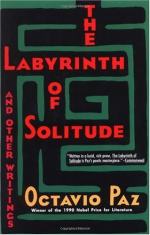
|
| Name: _________________________ | Period: ___________________ |
This test consists of 15 multiple choice questions and 5 short answer questions.
Multiple Choice Questions
1. Which of the following created the Spanish monarchy?
(a) Diversity.
(b) Unity.
(c) Violence.
(d) Political will.
2. According to Jorge Cuesta, how has Mexico created herself?
(a) With no regard for the common people.
(b) In opposition to her past.
(c) In agreement with her past.
(d) With an eye toward preventing civil war.
3. Who was Emiliano Zapata?
(a) The replacement in Diaz's regime.
(b) The first leader of the Revolution.
(c) The leader of the Revolution of the South.
(d) The military leader in Diaz's regime.
4. What is one factor that drives world markets?
(a) The unchallenged advantages of advanced countries.
(b) The low cost of raw materials, and the high cost of manufactured products.
(c) The unequal distribution of raw materials.
(d) The inability of third-world markets to compete.
5. How did the Aztecs' final struggle manifest itself?
(a) In silence.
(b) As the last battle.
(c) In destruction of their own property.
(d) In suicide.
6. What did Moctezuma think as the Spaniards approached?
(a) The gods had abandoned him.
(b) That was the moment of his deliverance.
(c) That was the time to prove his manliness.
(d) He would finally become Divine.
7. What should Mexicans recognize about their alienation from the world?
(a) It has managed to cut them off completely.
(b) It can be reversed only by a charismatic leader.
(c) It is shared by many people around the world.
(d) It is unique to their country.
8. Why was Diaz's regime in a precarious position regarding positivist philosophy?
(a) Because it could not afford to support such a philosophy when the regime itself was so new.
(b) Because the common people vehemently opposed the philosophy.
(c) Because it adopted rather than fathered the philosophy.
(d) Because only about half the regime favored the philosophy.
9. What did the Spaniards find when they arrived in South America?
(a) Scattered groups of people.
(b) Autonomous, refined civilizations.
(c) A single ruling power.
(d) Uneducated, struggling clans.
10. Why was unemployment high in Mexico at the time that Paz was writing?
(a) The economy was going through a recession.
(b) The population grew more quickly than industry.
(c) The two biggest factories were experiencing lay-offs.
(d) The labor unions made it difficult for workers to get jobs.
11. According to Paz, what must be the first step toward reform?
(a) A complete overthrow of the socialist state.
(b) A struggle against the lie that makes colonialism official.
(c) A return to traditionalism.
(d) A struggle against rampant government corruption.
12. How did the Reform want to justify itself?
(a) Through its popularity.
(b) Through its changes.
(c) Through the future.
(d) Through its past.
13. What was sacrificed when Porfirio Diaz took power and subdued anarchy?
(a) Possibility.
(b) Nothing.
(c) Liberty.
(d) Equality.
14. What was the most radical period of the Revolution?
(a) The Obregon Administration.
(b) The Calles Coup.
(c) The Cardenas Administration.
(d) The three months leading up to the revolt.
15. What was Vasconcelos' philosophy regarding the material world?
(a) Emotions, rather than intellect, comprehend the world and create reality.
(b) The material world cannot be understood nor explained.
(c) Intellect, rather than emotions, comprehends the world and creates reality.
(d) The supernatural world governs the material world.
Short Answer Questions
1. Why does poetry tend to eradicate history? (Chapter Seven).
2. According to the tribe of the Chamulas, what is a chulel?
3. In Paz's estimation, why do the common people follow their revolutionary leaders?
4. When did the Plan of Ayala go into effect?
5. In Paz's argument, how have tradition and religion always been presented to the Mexicans?
|
This section contains 646 words (approx. 3 pages at 300 words per page) |

|




